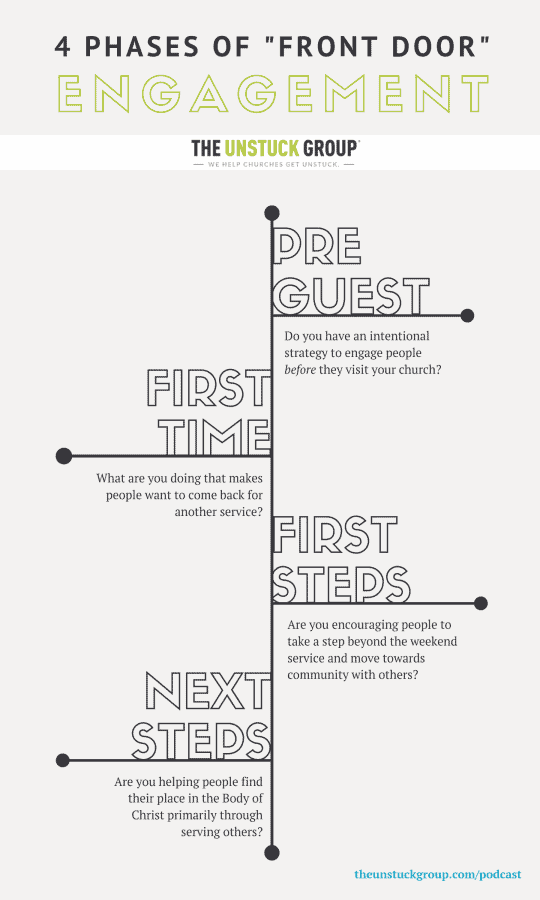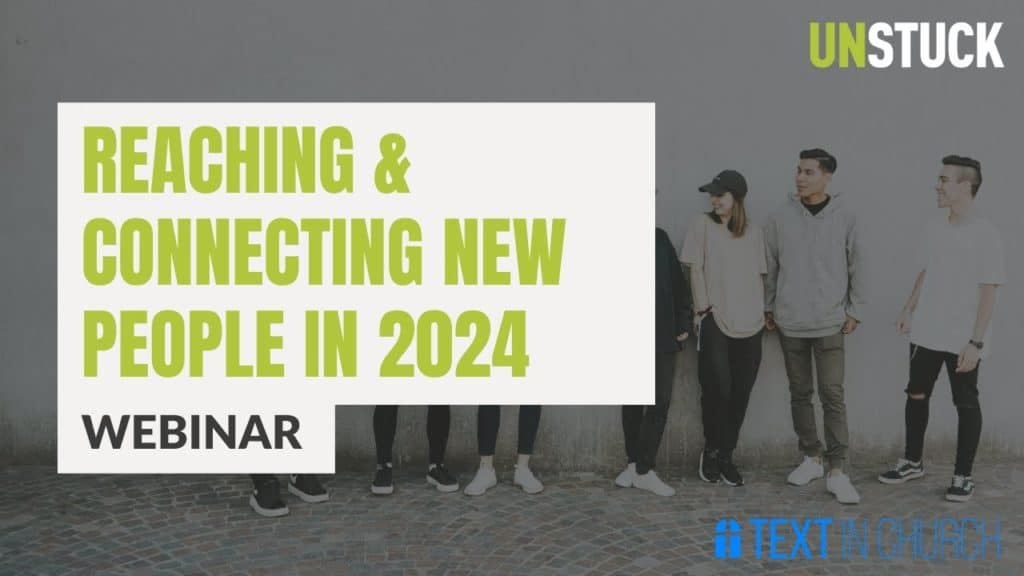Engaging Your Mission Field (Part 1)
If you enjoy this episode, subscribe on your device for more:
iTunes RSS Google Play Stitcher Spotify
Whether you like it or not, you are no longer the pastor of a church. Rather, you’re going to be a missionary to a people group who is far from God. In other words, we need to start acting more like missionaries in our communities rather than pastors of churches.
Churches drift towards an insider-focus over time—more attention is given to discipleship of Christ followers than to effective outreach and evangelism.
How do you fight that tendency?
I gathered some of my team members a few weeks back to talk about this. That group included some of my full-time staff at The Unstuck Group, and some of our wider consulting team, all of whom are still serving full-time on church staff teams.
We talked through what we’re seeing related to the steps churches can take to open their “front door” wider—the strategies they can embrace to keep themselves focused on the outsider.
That conversation is the foundation for this four-part series to unpack the key steps we see helping churches reach more new guests with the love of Jesus:

All four are critical—but we’ve found most churches only have strategies and structure to engage one or two of them.
In this first episode of the series, Amy and I share:
- 3 core elements of an effective pre-guest strategy
- How your church can demonstrate you’re there for your community, not to take from it, and the best real-life model we’ve seen that could inspire your church’s approach
- Why traditional marketing strategies don’t work anymore and what you should try instead
- Why you need a missionary mindset to reach new people using digital strategies, and what that practically looks like
- 2 simple questions to take to your next leadership team meeting to start a conversation about how you’ll reach your mission field in the future
Leader Conversation Guide
Want to take this conversation back to a staff or senior leadership team meeting?
Our Show Notes subscribers get a PDF download that recaps the episode content and includes a discussion guide you can print out and use at an upcoming meeting.
Opt-in here and get the Leader Conversation Guide for this episode, as well as access to the archive.
Share Your Thoughts and Questions on Social Media
We use #unstuckchurch on Twitter, and we start a real-time conversation each Wednesday morning when the episode drops. You can follow me @tonymorganlive and The Unstuck Group @unstuckgroup. If Facebook is where you spend your time, I’m there, too.
Links & Resources from the Episode
- Luke 14 – The Parable of the Great Banquet
- #ForGwinnett – Learn more at forgwinnett.org
- Why Church Communications Is Stuck in 2004 – Episode 61
- The Unstuck Process
Write a Review—It Helps!
Particularly on iTunes, your ratings and reviews really do help more pastors discover the podcast content I’m creating here. Would you take a minute to share your thoughts? Just open the the podcast on iTunes on your phone or computer, click Ratings & Reviews, and leave your opinion.
Transcript
Tony: 00:00 Here’s where I believe where we’re going—whether you like it or not, you are no longer the pastor of a church. Rather, you’re going to be a missionary to a people group who is far from God. In other words, we need to start acting more like missionaries in our community rather than pastors of churches.
Sean: 00:20 Welcome to The Unstuck Church Podcast where each week we’re exploring what it means to be an unstuck church. This week on the podcast, we’re beginning a four part series on how churches can better reach their mission field. From engaging with people before they ever attend to helping them become fully devoted followers of Jesus, we’re addressing practical ways that your church can better reach your community. Make sure before you listen to subscribe to get the show notes in your inbox. Every week you get one email with the leader conversation guide, all of the resources we mentioned during the episode and bonus resources to support the content. You’ll also get access to the archive of all of our podcast resources from past episodes. You can sign up by going to theunstuckgroup.com/podcast. Now, here are Tony and Amy to kick off our four part series on reaching your mission field with a conversation on pre-guests engagement.
Tony: 01:14 Well, Tony, this is actually the first of a series of four podcast episodes that we’re going to do dealing with the front door challenges that churches are facing. So, Tony, why are you so passionate about this topic?
Tony: 01:25 Yeah, well first it’s not always the case, but many times churches are stuck because it’s a front door challenge rather than a back door challenge. And I think the reason why this occurs so often is that churches just naturally drift to more of an insider focus rather than an outsider focus over time. In other words, more attention is given to discipleship of Christ followers rather than effective outreach and evangelism strategies to reach people outside the faith and outside the church. And Amy, you and I have talked about this in the past, but what happens in these situations, many times, is that the way we do church becomes more important than why we do church. And I think one of the reasons why this topic is so, I’m so passionate about it, is just because it’s personal to me. I’ve expressed this, but there are still people in my life, family members, friends, neighbors, people that I engage with on a regular basis—I mean where our kids are still active and we know parents and so on, and not all of them have a relationship with Jesus yet. And I just, I know the transformation God’s brought to my life through my relationship with Christ, how he’s impacted my marriage, my parenting, my purpose for life, what I do, it’s transformed who I am. And I just have this urgency to want more people to experience that as well and so it’s just become very personal to me. But what I want to share before we dive into this series is that this in my mind is not an either or option for churches. In fact, you and I work with churches on a weekly basis. And what we’re seeing is in healthy growing churches, they need both a front door strategy that works and a spiritual formation strategy that works to make sure that we don’t create a backdoor challenge.
Amy: 03:23 Right.
Tony: 03:23 But, I know that this is going to happen. In fact, I can already hear the email messages and DM messages and things like that coming through even before we engage this conversation. I know what’s going to happen with this focus on the front door challenge. We’re going to start hearing from people who will argue that I don’t care about discipleship. If you listened to any one of our podcast episodes in isolation, you’re missing quite a bit that we can’t talk about our entire strategy for helping churches get unstuck in every 20 to 30 minute episode, but we do talk about discipleship on a regular basis. In fact, if you sense spiritual formation is a challenge in your church, I highly recommend you go back and listen to episode #102, which is all about the primary reasons why churches are not producing spiritual growth. However, in this series we’re going to be focusing on dealing with that front door challenge that we find so commonly in the churches that we’re engaging with.
Amy: 04:27 Yep. So we’re going to be talking about this for four weeks. What’s your approach going to be for each of these podcasts?
Tony: 04:34 Yeah, so in this series, we’re going to impact the full engagement process that churches need to engage. And I’ve, in my mind, broken that out into four different phases. The first is the pre-guest engagement. It’s how we connect with people before they even visit our churches. The second phase is a first time guest experience, and this we’ve talked about quite a bit, but we’re going to unpack some new learnings that we’re seeing. It’s all about that first time that someone shows up to our church. The third phase is about the first steps engagement. How do we move that initial step from people attending a worship service to taking those first steps of engagement in our church? And then the final phase that we’re going to be talking about are— I’m calling them the next steps engagement, but it’s how we really move people into relationship with each other where they’re finding community through serving and groups and other avenues so they’re really staying engaged in our churches. Now here’s the deal—we’re talking about all four phases because my sense is that most churches only have strategies and structure to engage one or two of these four steps. Commonly, I see steps two and four, but one in three tend to get ignored. What we’re seeing in healthy churches is all four phases are critical to opening the front door and reaching more people for Jesus.
Amy: 06:05 Well, with that set up, let’s dive into the first step in the engagement process. You mentioned that this step is all about pre guest engagement. So where do you want to begin?
Tony: 06:14 Well, here’s a novel thing. Why don’t we begin with the Bible? In fact, related to this, I’ve always been challenged by the parable of the great banquet, which is found in Luke chapter 14. In fact, a couple of years ago, I paraphrased that story to put it into today’s context. And so, if you don’t mind, let me just read here my paraphrase of Luke 14. When you hold your weekend services, invite people who don’t have life figured out. Invite people who don’t have everything you have. Invite people who are facing physical, emotional, and relational challenges in their lives. Invite people who are blind to the fact that Jesus forgives and loves and brings hope. They may not contribute to your ministry with their time and money, but you will be repaid because of the kingdom impact you are making. I was once working with a church that was preparing for their weekend services and they invited many guests the week before the services. The church leaders encouraged their congregation to invite others and to tell those who had been invited, “Join us for everything has been prepared with you in mind.” But everyone who was invited began making excuses. They first said, “I have a bought a new vacation house, and I must go and see it. Please excuse me.” Another said, “My kid is in a tournament this weekend with five games and I’m on my way to see them. Please excuse me.” Still another said, “I just entered a new relationship and we’re spending time together so I can’t come.” The congregants came back and reported this news. Then the leadership became kind of angry and their sense of urgency for sharing the Gospel increased and they said, “Go out quickly into the community and neighborhoods and bring people who are struggling to make ends meet, invite people who are broken and hurting. Invite people who don’t have a relationship with Jesus. But the people in the congregation responded and explained, “What you’ve encouraged us to do has been done and there’s still room.” And then it was actually Jesus who said, “Go out to the roads and the country lanes and compel them to come in so that my house will be full.” And it’s just a reminder to me that there’s always going to be excuses, but there are always people that need what Jesus offers, but part of our responsibility is to go. We’re supposed to go and invest and develop relationships and eventually invite people to take their next steps toward Christ. God did not design our faith to be private. In fact, it’s just the opposite. We’re supposed to go and make disciples of all nations and it’s really impossible to do that while we’re trying to maintain a private faith.
Tony: 08:57 And then additionally, it’s impossible to compel anyone to do anything outside of an established relationship. All that to say, I’m convinced more than ever, that this step of pre-guest engagement begins by doing life with our family, our friends, our coworkers, our neighbors, the people that God places in our lives. We need to nurture those relationships so that we can invite or compel people to take that first step toward Christ.
Amy: 09:25 That’s really well said, Tony. It just, I don’t know, it just seems a lot easier to say that than to actually do that. Right?
Tony: 09:33 Yeah. Especially for those of us in full time ministry because if we’re not intentional about this, about developing relationships with people outside the church, we can easily find ourselves spending every moment of our lives with Christians. And that’s not God’s designed for our lives. Our culture is not doing us any favors here either because we’re more isolated than ever. We are lonely. And in fact, if you look at some of the data out there, it’s a little discouraging. In fact, last year, the health service company, Cigna revealed the results of a research study that they just completed. They surveyed over 20,000 adults ages 18 and older using a loneliness scale that was developed by UCLA. Go Bruins. Here are some of the results of their research. Nearly half of Americans report sometimes they’re always feeling alone or left out. Two in five Americans sometimes are or always feel that their relationships are not meaningful and that they’re isolated from others. The results suggested that Americans who live with others are less likely to be lonely. However, this does not apply to single parents and guardians, even though they live with children, they’re more likely to be lonely. So there’s something about engaging relationally with people that are in our season of life as well. Only around half of Americans have meaningful in-person social interaction, such as having extended conversation with a friend or spending quality time with family on a daily basis. Even more specifically generation Z , young adults, this is what the research showed, is the loneliest generation and it claims to be in the worse health than older generations, which is interesting because, related to this, very heavy users of social media had a higher loneliness score than those people who never use social media. So what it’s just suggesting again is we have a loneliness epidemic. We need relationships. And related to today’s topic, that relationship has to be the focus if we’re going to encourage people to take their next steps towards Christ.
Amy: 12:00 So what does that mean for churches then, Tony?
Tony: 12:03 So with that one element of a church’s pre-guest engagement strategy needs to include equipping people to develop relationships and have conversations with their family, friends, coworkers and neighbors. In other words, we need to help or inspire people in our churches to pray for those in their lives, that they’re doing life with, engaging conversations and listening well. Intentionally spending time with and serving those people, and then, when the time is appropriate, sharing our stories and inviting our compelling someone to take a step toward Christ. Unfortunately in our culture, this is not natural, but it is what God designed us to do. We need each other. And again, there’s no way to compel someone to take a step toward Christ outside of a relationship. And so, I just think part of what we need to do is remind our churches, those folks that are already inside the walls of our churches, already connected to our congregations, already know who Jesus is and are following Jesus, we almost have to re-equip those of us that are connected to the church and how we engage with people outside the church.
Amy: 13:20 And this is probably a topic for one of the other four podcasts, other three podcasts in this series, but it seems like there’s two important elements. One is, as a leader, as a vision caster, you have to inspire your people to do this, right? Don’t let them just be satisfied in Christian relationships—we need that too—but to be caring for other people. And then you have to have a weekend service that your people feel confident they can invite their friends and family to. Because if they don’t have that, you can inspire, inspire, but if they don’t feel like their guests are going to be treated in a way that’s going to be a compelling experience, they won’t do it, right?
Tony: 13:57 That’s right. And by the way, side note, if your friends feel like they’re our project rather than somebody you’re just getting to know, that’s not good either. Yeah. So yeah, we have to go back to the basics on what it is to develop relationships with people around us.
Amy: 14:13 That’s right. So part of the pre-guest engagement is helping our people develop relationships with other people in their lives. What’s another aspect of pre guest engagement?
Tony: 14:23 Yeah, so the second strategy when it comes to pre-guest is all about being for our communities. In other words, we need to answer the question, how can our churches demonstrate we’re there for our communities rather than taking from our communities? So part of this I think is just about building partnerships to invest our time, our financial resources, our leadership resources, and our voice to serve our ,. Which also helps us by the way, develop relationships with people outside the church. And that also helps us increase our brand awareness in our communities. In other words, people are going to begin to know our church because they know what we’re for in our communities. They begin to see the impact that we’re having in the communities where our churches are located. And I really believe the best model I’ve seen related to this topic is Gwinnett Church near Atlanta. Jeff Henderson is the lead pastor there. They’re one of the North Point locations in the Atlanta area and they launched #ForGwinnett before the church even opened in their community. They wanted the folks in their community to know from day one, we are going to be for our community, engaged in our community, impacting our community rather than taking from our community. And honestly, Amy, many times people outside the church, they’re just focused on what the church is trying to get from them rather than how the church is impacting the communities where they’re located. And you can actually learn more about the #ForGwinnett campaign at forgwinnett—that’s g w i n n e t t.org. And the other good news related to this is that Jeff has a new book coming out. It’s called Know What You’re For. It will release in the next several weeks here and I think we’re going to try to get him back on the podcast to talk even more about these practical strategies for churches to be for their communities.
Amy: 16:34 That’s great. So, not just in your community. I remember early in my church career, a lot of churches were in the community parade. And that’s really not for your community.
Tony: 16:45 Or just putting signs in your community. Don’t do that. Yeah. Yeah. Don’t do that.
Amy: 16:50 All right, so a church’s pre-guest engagement strategy needs to be first about developing relationships and second being for their communities. What’s next?
Tony: 16:59 Yeah. So the third aspect of a pre engagement strategy is all about marketing, but it’s not the type of marketing that your church has done in the past. In the past, we used traditional forms of marketing, newspaper ads, signs, postcards, billboards—that’s traditional marketing. We’re trying to push our message out to our intended audience. That used to work. That doesn’t work anymore. Though we still get newspaper once a week here, Amy, in my neighborhood, and there are still churches that are trying this marketing approach. Yep. People are ignoring that type of marketing. It’s really just become noise in our lives. The big challenge that you need to overcome is that normal people think church is irrelevant at best. Letting know your church meets at a certain location at a certain time through traditional marketing will not help you reach people outside the faith and outside the church. A couple of weeks ago now, our team spent some time with Carey Nieuwhof, and among the topics that we discussed, he was talking about the state of church in today’s culture. We spent that time wanting, with Carey, wanting to hear from him his perspective of the Church in Canada, which I believe is a precursor of what we can expect the church to look like in the U.S. In the coming years. And it was a little disheartening. He mentioned that in his community, only 3% of people are connected to a church.
Amy: 18:34 Yeah, wasn’t that surprising? Wow.
Tony: 18:35 Yeah. So, we’re engaging this conversation about where the culture is in Canada, where it’s headed in the U.S. And as he was talking about that, the big thought I had is this, and I don’t think pastors are gonna like to hear this, but here’s where I believe where we’re going—whether you like it or not, you are no longer the pastor of a church. Rather you’re going to be a missionary to a people group who is far from God. In other words, we need to start acting more like missionaries in our community rather than pastors of churches.
Amy: 19:14 Wow, that’s really good. That’s a total frame shift—being a pastor of a flock versus being a missionary in a new people group. Wow. How does that, concept of being a missionary connect with this pre engagement kind of content marketing that you’re talking about?
Tony: 19:31 Yeah. So we need to begin first by learning more about our mission field. With that in mind, we need to confirm who we’re trying to reach. We need to research who they are and the questions that they’re asking. And then once we have a foundation of knowledge about who is in our mission field and the challenges that they’re facing in their lives, then we need to in our marketing, which becomes more like content marketing, begin to create and distribute content that addresses these questions. In fact, one church I was with recently engaged in this process and they determined these were the key questions people in their mission field were asking. One of the questions was, “Once you see my flaws, will you still love me?” In other words, that person is looking for acceptance. Another question they were sensing is just that foundational question of, “Who am I?,” Which is really all about identity. Another key question they were sensing in their mission field is, “How do I parent my kids and am I doing it right?” Which is much more practical, but these are life issues that people are dealing with in their mission field, and really scripture has a lot to say about these topics. Another question, again, pretty foundational, but, “Why do I matter?,” which is all about purpose. So as we’re engaging this new approach to marketing, we’re trying to connect with people outside of our churches and outside the faith, I really do begin to think that, as we answer these key questions, that needs to start with the Sunday message. But then, we get to slice it up and share nuggets of that content through our website, our email list, our social media. In other words, you don’t have to wait until Sunday. You can actually start sharing content that addresses these key questions through articles and podcasts and youtube videos and so on.
Tony: 21:33 In other words, I want to encourage you to become a trusted resource for the key questions people are asking in your community. Help pre-guests see that Jesus and the Bible can actually be relevant to their lives and share stories of people whose lives have been transformed by Jesus. In other words, we need to give people a reason to say yes when someone invites them to take a next step toward Jesus.
Amy: 21:58 Good stuff. Hey, I think we need to wind this up, but you might have three or four more ideas than I do, but we’ll save them for another time. Any final thoughts as we wrap up, Tony?
Tony: 22:09 Amy, do you notice I have some passion on this topic?
Amy: 22:13 I can tell.
Tony: 22:13 Yeah. Today, I talked about three intentional steps your church can take to have a pre-guest engagement strategy. And I mentioned equipping people to develop relationships with their friends and neighbors, becoming a church that’s for your community, and then creating and sharing content that addresses questions that people are asking. These are three methods that we see working to help churches address their front door challenges. Your ministry strategy may look different, but here’s my challenge for you today. Ask these two critical questions. First, do we know who we’re trying to reach as a church? Do we really know them? And then secondly, do we have an intentional strategy to engage people before they visit our church? You have to answer those two questions before you can ever hope to swing open the front door of your church.
Sean: 23:09 Well, thanks for joining us on this week’s podcast. If you’d like what you’re hearing on the podcast, we would love it if you’d help us get the content out by subscribing on your favorite podcasting platform, giving us a review and telling anyone who would benefit from this podcast. At The Unstuck Group, we’re working every day with church leaders to help them build healthy churches by guiding them through specifically designed experiences that focus them on vision, strategy, and action. If that’s a need in your church, we would love to talk. You can start a conversation with us by going to theunstuckgroup.com. Next week, we’re back with another brand new episode. Until then, have a great week.






